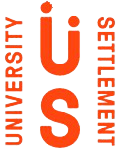University Settlement stands in opposition of the proposed changes to the ‘Public Charge’ rule. The federal administration’s proposed expansion of the ‘Public Charge’ rule to include Medicaid, SNAP, and/or housing assistance programs threatens ALL immigrants and ALL New Yorkers by placing more vulnerable children and families at-risk.
For over 130 years, University Settlement has sought to be a place of refuge for those seeking support, regardless of background or immigration status. University Settlement annually serves 40,000 New Yorkers of all ages across a variety of programs from early childhood to older adult services. At least 12% of University Settlement participants, shared with the agency that they were born outside of the United States. This is a sizable proportion of University Settlement participants and proportions of the Lower East Side and Brooklyn neighborhoods where our programs are housed. However, we believe this is still a vast undercount of immigrant participants due to a fear of disclosing private information to official institutions, which may be perceived as an arm of the government.
While some government-funded programs’ require the collection of specific demographic information to determine eligibility, most University Settlement programs make it voluntary to share national origin, immigration status, and income-level to preserve the dignity and self-determination of all people. Our primary mission to strengthen communities’ overall health and build opportunities from within demands that we open our doors to everyone without exception. It is most important to the vitality of our whole community that everyone feels welcome to access and participate in all the resources University Settlement has to offer without unnecessary barriers. It is governmental policy changes like this one which undermine this spirit (and cultivated environment) of inclusion and force immigrants to “choose” between caring for their children and preserving their documentation status and/or chance for citizenship in the future.
As an agency, we know individuals will make the painful choice to stop receiving services in this situation. Parents will be afraid to share the information needed to enroll their children in our early childhood and mental health programs. Households at risk of eviction will be afraid to seek our housing assistance or legal representation in housing court. Families will decide not to seek SNAP or WIC nutritional benefits and food insecurity will grow within our community. Children cannot thrive and learn without proper nutrition and healthcare. Families cannot thrive when their children are at risk. And all communities do not thrive when its families and children are suffering and at-risk.
The fear surrounding disclosure and withdrawal from critical, supportive services will only increase if the proposed changes to the ‘Public Charge’ rule are approved. The proposed changes singles out the poor and most vulnerable within our communities. This proposed rule change does great harm in the short-term and long-term to both children and families whom already face extensive vulnerabilities due to poverty, neighborhood affordability, trauma, and language inaccessibility. Approval of this rule will only lead to an increase in homelessness, hunger, and hospitalizations across the city. The ‘Public Charge’ changes were proposed to reduce spending due to the false assumption that poor immigrants may become financially dependent on the state; in reality, the removal of safety-net services will overburden emergency services in the city and increase spending on ineffective “Band-Aid” solutions.
At University Settlement, we are most concerned about the well-being of our 1,500 children under 5-years old and their families, our 2,000 seniors, and our 4,500 school-age children and youth.
Of the 12% of University Settlement participants born outside the United States, 85% are living at or well below the poverty-line and thus many are eligible to receive various public benefits. Not only are these supportive programs a necessity for families to survive in a very expensive environment, but they are a human right! At University Settlement, 28% of immigrant participants already do receive some form of public assistance. In our conservative estimates, across all programs at University Settlement, we believed that over 2,000 families would be at-risk should this rule be approved. Community members will be forced to choose between safely supporting their families with food, healthcare, shelter, and education or staying in this country. In fact, based only on the proposed change, families have told us they are declining benefits.
This is not a questions of possibility…but certainty if the changes to the ‘Public Charge’ rule are approved. At the end of the day, our concerns surrounding the ‘Public Charge’ rule are not about saving a few dollars in Washington but, rather a matter of survival and protecting our communities. University Settlement calls for the immediate withdrawal of the ‘Public Charge’ proposal and we stand with all our neighbors because all communities are made significantly stronger by immigrants.
Melissa Aase
Executive Director
Eric Weingartner
Chief Executive Officer

